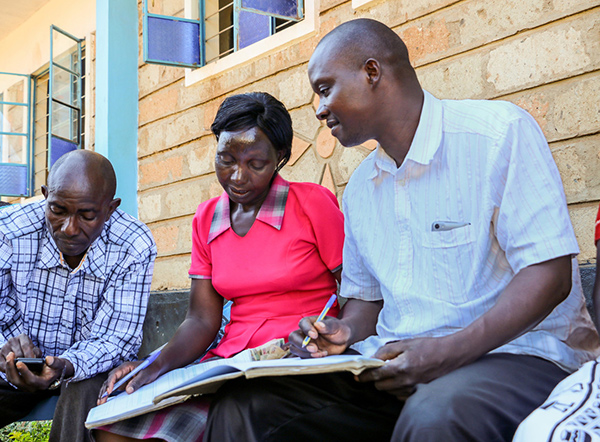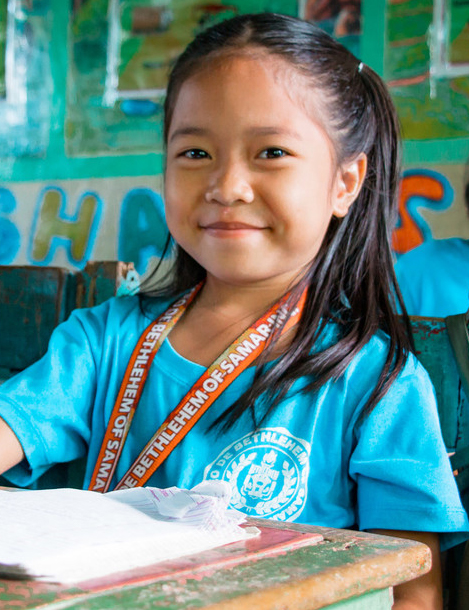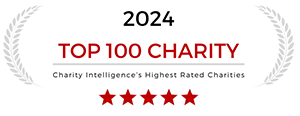In 2018, Chalice staff in Canada launched a six-month pilot to test a data collection tool designed to help site staff workers track the progress of the sponsored children  and their families. The goal of the exercise was to create a more complete picture of how sponsorship creates tangible and intangible improvements to the families' health, happiness, and hope for the future.
and their families. The goal of the exercise was to create a more complete picture of how sponsorship creates tangible and intangible improvements to the families' health, happiness, and hope for the future.
Eight sites, representing each of the regions where Chalice serves, agreed to be the test-drivers. Their participation involved compiling their existing site statistices (i.e. school enrollment, parents involved in circle groups) into the database tool, and conducting brief interviews with all sponsored children and their families.
Over the six-month period, involving more than 9,000 sponsored individuals in 137 communities, inspiring observations of hope and change emerged from the reports. When sponsorship has alleviated the financial burden on parents to send their children to school, the ripple effects are quickly seen in the family life and the community dynamic. "We can see the changes in the lives of the children that takes place through education; parents are so grateful, relieving them of a stressful life they cannot handle at times because of their family situation," wrote Sr. Jyoti in Goa, India, "and we can see the family approach towards the neighbour and community."
"During the interview, one mother shared how she felt so helpless before and how she would hide at times when her children begged for food or money for their requirements at school. Now, she has become more confident and faces the demands of her family with much positivity," reflected Maricel in Samar, Philippines. "It has been astonishing to observe the remarkable progression that happened in the lives of the beneficiaries. Saliently, is the positive outlook of the children. They have become very optimistic that they can achieve all their goals in life," she added.
When the eight sites had completed the pilot project, they all saw value in implementing this method of information collection as a standardized tool for all of Chalice's sites. Many saw it as a means to help their site refine their programs to address the most significant needs in their communities and provide the most effective solutions. "...this is a monitoring and evaluation tool that will help Mikinduri site in evaluating progress of the sponsored children, their families, and the community at large. (It provides) a clear view of how the Chalice programs are benefiting the community," wrote Carolyne, Site Director in Mikinduri, Kenya.
Having reviewed the data and feedback from the pilot, the Canadian team is collaborating with the sites in each region to implement a database tool that will make the ongoing data collection efficient and standardized.
Goal: Our goal was to begin training and implementation of the tool and database across all Chalice sites from January 1 - December 31, 2020. Our goal for rollout has been disrupted due to the recent global COVID-19 pandemic. Many of our sponsor sites have shut down or are running with a skeleton in-office crew. We have launched an online classroom, bringing nearly 100 site staff, regional staff, and Chalice Canada staff to learn together and practice identifying change at the child, family, and community levels. We hosted four virtual coaching sessions, connecting more than 50 sites, from five regions, in five languages!
We are striving to continue training and implementation by June 2021 and continue virtual coaching sessions as we begin to understand that our sites will need continued training with the new set of tools and database.
Seeing the ripple effects in Samar
Since 2000, Chalice has worked with children and families on the island of Samar in the Philippines to increase access to education, improve nutrition, and bring positive change in the communities. In 2018, as part of a research and evaluation program conducted by Canadian staff, the Samar staff had the opportunity to reflect on their 18 years of service, and realize just how far they had come.
Through personal interviews with the children and their families, along with an extensive statistics analysis, the staff pieced together the story of Chalice's true impact in their neighborhoods. Again and again, she saw that alleviating the financial stress associated with keeping children in school had a link to healthier families, and by extension, reduced conflict in the wider community.
their neighborhoods. Again and again, she saw that alleviating the financial stress associated with keeping children in school had a link to healthier families, and by extension, reduced conflict in the wider community.
"Providing their school and other needs prevented the conflict between the (family) members and resulted (in) better school performance," describes Maricel, Site Director in Samar. "Many families acknowledge that raising the families now has been a lot easier not only in that they are assisted in many necessities but also because they have now built a more harmonious relationship between family members."
More children enrolled in school meant fewer were finding trouble, "and more children in the community aspire to have a better life," which in turn, keeps enrollment strong. "With the help they receive for their nutrition and health needs, the illness and malnutrition rate of the community has also been reduced."
One of the most impactful ways the Samar site staff have seen change is through community workshops led by field workers. Maricel describes that it is "best to discourse topics confronting the society itself, such as drug addiction, disaster migration, business skills and skills trainings." Using the research tool, the field workers could compare notes on the level of interest and effectiveness of their different workshop ideas, and share best practices to help the families get the most out of the training.
One Samarian family became a prime example of how these workshops could be transformative:
"The father used his training in Microenterprise Development to find a job as a construction worker and he is more inspired to work because the couple's relationship has improved ever since the father started attending a Gender Based Violence course," describes Maricel. (T)hey now seldom fight because of financial restraint, due to the training received in Financial Literacy."
Overall, at the end of the research project, Maricel said the progress she sees is "astonishing" especially in children's positive outlook on life.
"They have become very optimistic that they can achieve all their goals in life, especially finishing their academic careers and landing a stable job in the future."



